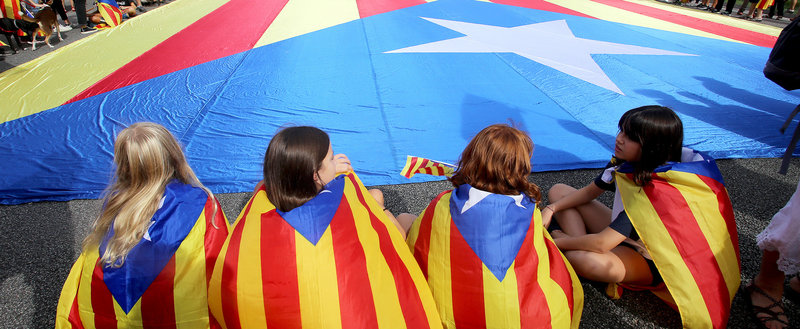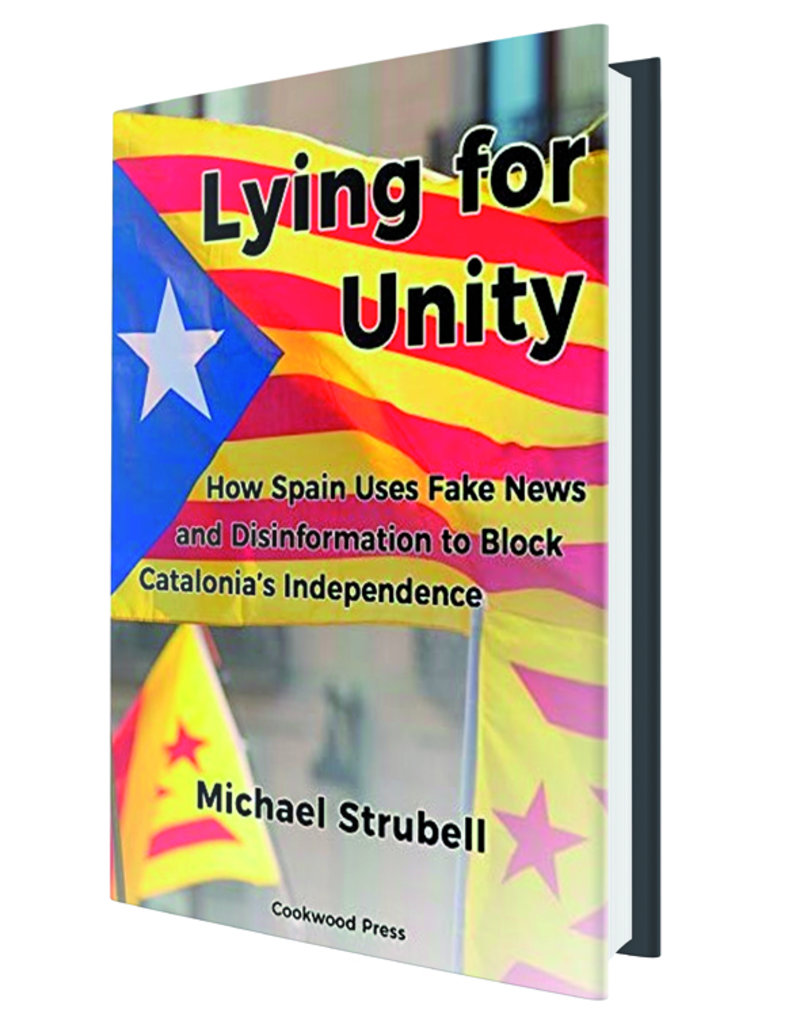Pork pies in bulk
Michael aka Miquel Strubell has more degrees than you can shake a stick at, what with the ones in Psychology and Physiology from Oxford University, in the Psychology of Education from London’s Institute of Education, and in Psychology from the Autonomous University of Barcelona; to say nothing of his experience as teacher at the Open University of Catalonia and his work for the Council of Europe, the Organisation for Security and Co-operation in Europe, the European Parliament as well as his enduring non-party grass roots work in favour of a democratic solution to the ongoing conflict between Spain and Catalonia. Qualifications which are clearly on show in his new book, following a concise and precise explanatory preface from Henry Ettinghausen (Emeritus Professor of Spanish at the University of Southampton) which puts us painlessly into the Catalan political picture. Strubell then rolls out the extraordinary range of untruths which have been used by different Spanish governments and their affiliated media to discredit the Catalan pro-independence movement, as soon as the latter got off the ground in 2012.
Not a stone is left unturned: Madrid’s attempts to prevent an academic debate in 2013 about the Catalan-Spanish conflict (by threatening to cut off all negotiations with the Catalan government, which hadn’t started and never would); the repeated efforts on the part of a writer on El País newspaper to accuse the independence movement of being backed by clandestine Russian agents, to the extent that in a WhatsApp message, the same journalist claimed (presumably as a joke?) that the Russians were prepared to send 10,000 troops into Catalonia to guarantee the success of the 2017 referendum; the CIA forgeries published on more than one front page of the El Periódico de Catalunya newspaper which purported to be from the CIA (despite grammatical mistakes typically made by Spanish speakers and the use - pointed out by Julian Assange - of non-CIA punctuation) saying that the Catalan police aka the Mossos d’Esquadra, had been tipped off about the August 2017 terrorist attacks in Catalonia, implying that they had known about them all along yet done nothing to prevent them; the suspiciously over-nonchalant attempts by the then Foreign Minister Alfonso Dastis to convince a BBC journalist that the countless scenes of peaceful voters being beaten by Spanish police on Referendum Day were ’fake news’ even though those same images had been filmed by the BBC itself; Dastis’s further lie - less publicised - to another BBC journalist, that Spain was considering constitutional changes to allow independence referendums in the future; the denial from various Spanish media sources that there was any Catalonophobia in Spain (despite well-researched charts that showed they were the most disliked population group in the state) but that, on the contrary, there was a great deal of Hispanophobia in Catalonia (a fact belied by those same charts); the accusations of outrageous pro-independence bias on Catalan public media (reported by four unionist newspapers, including La Razón and La Vanguardia) despite a subsequent report from a media watchdog group that on Spanish chat shows, 97% of the participants were anti-independence and only 2% were pro (the figures for comparable Catalan radio and TV shows were 38% and 55%, respectively); the declarations from the Madrid representative on the European Council on Foreign Relations that Catalonia’s independence movement was ’a threat to democracy’ (although according to the American Hispanist Thomas Harrington: ’far from being a threat to democracy in Europe, the scrupulously peaceful and people-driven movement…is perhaps, the best hope we have for spurring [democracy’s] renewal’). On top of which, of course, we have the countless claims that the Catalan movement is populist, with all that entails, meaning that it is Brexitish, authoritarian, Nazi etc. (the profile of pro-indy supporters does not match, in the least, that of the supporters of populist leaders in the rest of Europe or abroad, and comparisons with Brexit and much less Nazism do not hold a single drop of water).
Strubell also looks at some (even) weirder accusations levied against the pro-independence camp: that it was financed by the Soros Foundation and the US, that it supported the Russian annexation of Crimea, that Venezuela has had a hand in it (somehow, somewhere) or that the independence of Catalonia would have necessitated the bombing of Madrid…
What stands out most starkly, having read all this, is the extent to which the Catalan pro-independence movement gave a very bad case of the willies to the Spanish state, if not actually scaring the bejesus out of it. Ever since the early 18th century, when Spain made its first concerted (and violent) effort to become a unified state based on similar European models (especially the French one) it has never managed to consolidate anything approaching a comprehensive, voluntary sense of national unity on its own territory. Strubell’s book shows, then, to what extent it still gets the heebie-jeebies when this inherent, intrinsic lack of genuine national coherence is laid bare for all to see, as the Catalans have done over the last decade.
If any criticisms are to be made of the book, they are not so much to do with the author’s political leanings (he never fails to remind us when he is biased as regards this or that opinion), but with certain technical glitches. Every book suffers from a certain amount of gremlins during the production process, but here they would seem to have gate-crashed the text without much let or hindrance: some surnames are missing, some footnote indicators are given in large not small numbers, italics sometimes seem to be used at random, and some of the translations into English of Spanish, Catalan or texts from other languages contain grammatical errors; on top of which there is - not always, but on occasion - a tendency to take for granted the reader’s familiarity with all the references used. I for one, had no idea what the Real Elcano Institute was, and although it is mentioned frequently throughout the text, we get no explanation of what it really consists of until towards the end; similarly, the impact of Joan B.Culla and Francesc Serés abandoning their columns in El País newspaper because of its anti-independence propaganda would not necessarily be appreciated by somebody who wasn’t aware that they were a major historian and a novelist ditto, respectively. Etcetera. In short, a stricter proofreading and an even stricter control of layout would have improved this necessary and well-documented book. Which doesn’t mean it still isn’t well worth reading.
book review




